
The Sunday Mail

State enterprises and parastatals are required to have their financial statements audited and are supposed to submit these within a few months of the end of each year to the Auditor-General.
This is similar to processes in the private sector, where companies listed on stock exchanges must have audit reports by a respected private sector firm of auditors. Results of those audits have to appear in annual reports.
This is because anyone can buy and hold their shares and so the owners, the shareholders, are entitled to know the financial details of what they own, and to be certain that accepted international accounting standards have been followed and any gaps, or odd financial decisions, are highlighted.
It is exactly the same for the Government, local authorities and State-owned enterprises.
These handle public funds and provide public services and so the “owners”, who happen to be the citizens of Zimbabwe, are entitled to know that the money has been properly accounted for, and at least criminal uses, such as corruption, have not been an issue.
This, for all audited entities in both the private sector and the public sector, means the debate can shift to whether the money was spent wisely, whether debts are building up because customers and users of services are not paying, and whether the management is doing a good, bad or indifferent job.
These analyses require accurate and informative accounts.
So, an audit is not just an anti-corruption measure, although that is obviously an important function of auditors, but it should also lead to an assurance that what the accounts tell us is an accurate reflection of what is going on within the company to allow a more detailed debate on just how well the entity is being managed and what short-term and long-term financial problems might be looming.
Of course, given our more recent history, the need to plough through financial statements to ensure there is no corruption tends to dominate the headlines, and makes missing sets of accounts serious.
In her latest round of audit reports, acting Auditor-General Mrs Rhea Kunjinga, has been reporting missing sets of financial statements from last year, with many of the entities not handing them in on time. Also missing are statements for the year before and in some cases, having reported nothing for some years, in a few cases, for more than a decade. Over the last couple of weeks, we have seen Mrs Kunjinga reporting on both the local authorities and the parastatals, and she was not impressed by many in both groups.
Among the local authorities, there was a good batch that had not sent her their financial statements, and this included the City of Harare, which, as early reports of the Auditor-General had underlined, actually has a major problem in preparing accounts.
But among those that did submit accounts, she found examples of poor use of funds and what amounted to misuse.
As these reports go to Parliament’s Public Accounts Committee and its sub-committees, and as Parliament lets its portfolio committees loose on them, action can be taken.
At the very least, senior executives and managers in the local authorities and the State-owned enterprises can be hauled before the appropriate committee and made to explain themselves.
When it comes to using public money, Parliament has exceptional powers and when you are summoned you have to go, with your records, and explain.
The law-making functions of Parliament tend to dominate public debate, but its power over public finances and taxation is probably more important.
In the report on State-owned enterprises, Mrs Kunjinga lists 51 entities, large and small, whose accounts for last year she is yet to see. Some of these are huge, such as the Airports Company of Zimbabwe, which owns and controls all public airports and which is in the midst of major and expensive upgrades, and the National Railways of Zimbabwe, which used to be the biggest public entity in Zimbabwe after central Government. It has now started a process of rehabilitation and upgrade.
In both cases, partners and lenders would like to be fully informed, and would insist on proper audited financial statements so they can do the sums.
Even where financial statements were handed in, Mrs Kinjinga found that poor management and decision making were a far larger challenge than she was prepared to tolerate. Automation of revenue collection in most enterprises had improved efficiency, but she still found far too many were owed large sums of money, with debtor records on the skimpy side, which made collection of that money even harder.
Major changes in the public procurement laws and systems had seen improvements, and the far greater level of transparency had made it much easier to see where there were still failings, with non-delivery of ordered and paid-for or partially paid-for goods still a problem.
There were also the management failures, such as delayed maintenance of buildings and delays in replacing vehicle fleets that would impact efficiency of services. These are all linked.
If you are owed money and find it hard to collect those debts, you may well have to pay some procurement bills upfront because suppliers do not want to be next in the chain of unpaid bills, and you may have to delay some critical spending because the cash is not in your bank account.
It is reporting this range of non-corrupt but still inefficient management that is in many ways the most important function of an audit report, so that the entities can reform, and the relevant Parliamentary committee can get stuck in and force entities to explain how they are fixing the problems.
We hope lessons have been learnt and that those entities caught on the wrong side of the law will reform.
Now is the time to play ball as we head towards an upper middle-income economy. Efficient service delivery is of the essence.



